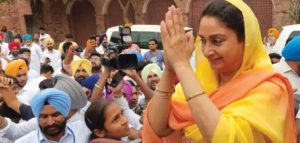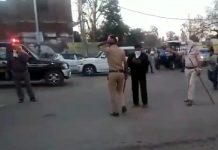 This is quite a game, politics. There are no permanent enemies, and no permanent friends, only permanent interests.” American Congressman William Clay very succinctly sketched an oft-visible peculiarity in politics.
This is quite a game, politics. There are no permanent enemies, and no permanent friends, only permanent interests.” American Congressman William Clay very succinctly sketched an oft-visible peculiarity in politics.
As one of the oldest alliances in Indian politics and touted to be one that was forged on steady friendship and mutual respect — the Shiromani Akali Dal-Bharatiya Janata Party, came to an unceremonious and much publicised end, these words had a timely ring to them. SAD chief Sukhbir Singh Badal recently announced that they were parting ways with the NDA over “anti-farmer, anti-Punjab” bills. He did not hold back any punches while calling the bills “lethal and disastrous” for its biggest voter base — the farmers.
Ahead of the political storm to hit the Centre, no love was lost between the BJP and Punjab’s grand old party as the former pushed through Farm Bills in the Upper House last week, inviting ire of not only thousands of farmers across the country but also its oldest and most trusted ally-the SAD.
The Badals had previously supported the ordinances and failed to gauge the swelling discontent against them. As they received heat from farmers for this endorsement, the SAD, in a complete U-turn, pledged unfaltering allegiance to the agriculturists, to the extent that it even pulled out its lone minister Harsimrat Kaur Badal from the Narendra Modi cabinet, to “protest” against the bills. The resignation was also largely propelled by an overwhelming sentiment against the BJP not just by farmers but within the party too.
Several SAD seniors had given clarion call to break away from the BJP, and had even sharpened their attack over the Farm Bills. Punjab chief minister Amarinder Singh had also goaded the SAD to walk the talk and quit the NDA, slamming Harsimrat’s resignation as “political compunction”.
The SAD-BJP coalition dates back to 1996 when Parkash Singh Badal had backed the BJP after it won the Lok Sabha elections and staked claim to form the government. This was the era of Atal Behari Vajpayee and LK Advani — BJP stalwarts who shared a ‘special friendship’ with vadde Badal saab, steeling the ties that were duly conserved by the second generation–Sukhbir and Harsimrat. That the BJP values this decades-old relationship was further accentuated by PM Modi in April 2019 when he touched the feet of Parkash Singh Badal (92) before filing his nomination papers for General Elections.
The SAD patriarch is two decades senior to him in age and politics. Television channels beamed the gesture, underlining the BJP’s respect and trust with its oldest partner. SAD and its loyalty were a constant for BJP as it never came under scanner. The two even shared power in Punjab for a decade-2007-2017 in a seemingly smooth sail. The BJP, that has gained political fortunes in the agrigarian state largely by piggybacking on SAD, was happy playing second fiddle.
The duo had also managed to stay afloat together despite the challenges they had faced in the past. Senior Badal frequently described the alliance as nau-maas da rishta(like nail and flesh), underscoring it as unbreakable and everlasting. The five-time CM is also credited with keeping it intact over these decades as the astute politician saw the affiliation as a telling example of Hindu-Sikh unity, something that he saw was important for social and emotional sensitivities of a state ravaged by terrorism in the past.
The SAD-BJP that had tided over differing political alignments in neighbouring state of Haryana, opposing views over SYL canal, Citizens Amendment Act(CAA), and internal bickering, Farmers Bill and Harsimrat’s resignation proved to be insurmountable. “We had not hoped things to come to such a pass since both the parties go back decades. It is unfortunate that instead of helping us dispel the ‘myths’ surrounding the Bill, the Badals decided to side with the farmers,” said a senior BJP leader.
What he, however, failed to mention was that lately, fissures had started to appear in the political union with the BJP, buoyed by its clean sweep in Parliament elections, asserting for a greater role in the state.
The right-wing party had made no bones about demanding greater seat share, from 23 to around 50. It also announced party office bearers for all the 117 Assembly constituencies, hinting that if things don’t bode well for the two, it would not shy away from going alone in the next Assembly elections.
In another move that caused discord between SAD and BJP, the latter awarded Padma Vibhushan to Sukhdev Singh Dhindsa who had dissented from the Badals and formed its own party along with other defectors, ahead of 2019 LS polls.
Distancing itself from NDA may earn SAD brownie points among Jat Sikh farmers who are its traditional vote base, the break-up will have far-reaching consequences for the BJP that was planning to make in-roads in the rural parts of Punjab as maximum opposition against the Bill is coming from villages. While the saffron party’s bravado knows no bounds, having
declared it will form a government in Punjab in 2022, the impediments are one too many.
Starting from the number of seats it has to stake win on. As opposed to the 23 seats it got as a SAD ally, it will now have to get additional 94 constituencies in the 117-member House. Moreover, lack of sizeable number of Sikh faces in the state will also weaken its chance of securing an outright win against Congress and SAD. Needless to add, the party will have to work with double the force in all the 94 seats.
The SAD, on the other hand, has got a better bargain as it will have to contest from 23 extra seats where they enjoy extensive hold. To offset this, the BJP hopes to bank on rebels like Sukhdev Singh Dhindsa who broke away from SAD to form his own SAD(Democratic). However, given the backlash the Modi government is facing from farmers in Punjab, it seems highly improbable that even rival factions will join hands with BJP.
letters@tehelka.com













